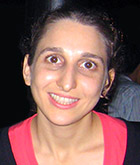Sacrifice, Love, and Rubber Sandals: Narrating War and Peace in Vietnam
In this talk, Dr Merav Shohet presents an excerpt from her book manuscript-in-progress, 'Sustaining Sacrifice: Language, Love and Devotion in Contemporary Vietnam'. Rather than delineate the arc of the book in its entirety, it will focus on the story of Tan, a patriotic former war prisoner and combatant, whose biography was embroiled in his nation’s history.
Lunch Lecture by Dr Merav Shohet from the Department of Anthropology at Boston University, USA.
Lunch will be provided. Registration is required.
Co-organised by IIAS and the Institute of Cultural Anthropology and Development Sociology at Leiden University.
In this talk, Dr Merav Shohet presents an excerpt from her book manuscript-in-progress, 'Sustaining Sacrifice: Language, Love and Devotion in Contemporary Vietnam'. Broadly, the book focuses on two key principles, hy sinh (sacrifice) and tình cảm (sentiment/affection rooted in material relations of care), which operate in marketizing, late-socialist Vietnam as ethical structures of feeling that facilitate efforts to forget past suffering and divisiveness in favor of optimistic, or at least equanimous bearing of hardship, when facing an uncertain future.
Shohet argues that despite seismic political and economic rifts and shifts in Vietnam in the last century, people’s idealization of tình cảm - together with their historic (Confucian- and Buddhist-inflected) understandings of sacrifice as willingly, silently, and smilingly embracing hardship for the benefit of asymmetrically positioned others- fosters personal, familial, and community resilience in this formerly war-torn region.
Buttressed by state discourses and slogans, hy sinh and tình cảm serve in everyday practice, ritual, and narration as prescriptive moral means by which to organize social relations that smooth over political-economic, generational, and gendered divisions that otherwise threaten to come to the fore and potentially sunder familial harmony and unity.
The story of Tan
Rather than delineate the arc of the book in its entirety, this talk will excerpt the story of Tan, a patriotic former war prisoner and combatant, whose biography was embroiled in his nation’s history. Weaving together the ordinary and extraordinary, visceral as ethical, Tan’s account exemplifies the ways in which individual, familial, and national sacrifices are mutually entangled.
By explicitly or implicitly alluding to sacrifice and tình cảm, Tan helps us understand how “ordinary sacrifice” is at once an essential—and encompassing—component of the “extraordinary” (religious or patriotic) sacrifices, more typically theorized in anthropology. His narrative’s content, as well as form (e.g., pacing, idioms, and repetitions), Shohet argues, together demonstrate the relative silence of sacrifice, and of love as pain-filled, personal and patriotic. By attending to Tan’s story as it unfolds, we see how the extraordinary is lived as ordinary, and how muted suffering over years came to be understood as sacrifice rooted in tình cảm.
The speaker
 Merav Shohet is an assistant professor in the Department of Anthropology at Boston University. Trained as a psychological, medical, and linguistic anthropologist, Dr. Shohet has extensive research experience in Vietnam on the topics of everyday sacrifice, narrative, morality, care, language socialization, affect/emotion, and intergenerational family relationships in this post-war, late-socialist context. Additionally, Dr. Shohet has researched and published on narrative, illness, and recovery from anorexia and eating disorders, and on families’ mealtime and food practices in North America.
Merav Shohet is an assistant professor in the Department of Anthropology at Boston University. Trained as a psychological, medical, and linguistic anthropologist, Dr. Shohet has extensive research experience in Vietnam on the topics of everyday sacrifice, narrative, morality, care, language socialization, affect/emotion, and intergenerational family relationships in this post-war, late-socialist context. Additionally, Dr. Shohet has researched and published on narrative, illness, and recovery from anorexia and eating disorders, and on families’ mealtime and food practices in North America.
Registration (required)
If you would like to attend this lecture, Please register via the webform provided below, and by Tuesday 28 August, 12:00 hrs if you would like IIAS to provide lunch.
About IIAS Lunch Lectures
Every month, one of the IIAS affiliated fellows will give an informal presentation about his/her work-in-progress for colleagues and others interested. Lunch lectures are sometimes also organised for visiting scholars.
IIAS organises these lectures to provide the research community with an opportunity to freely discuss ongoing research and exchange thoughts and ideas. Anyone with an interest in the subject matter at hand is welcome to attend and join the discussion.